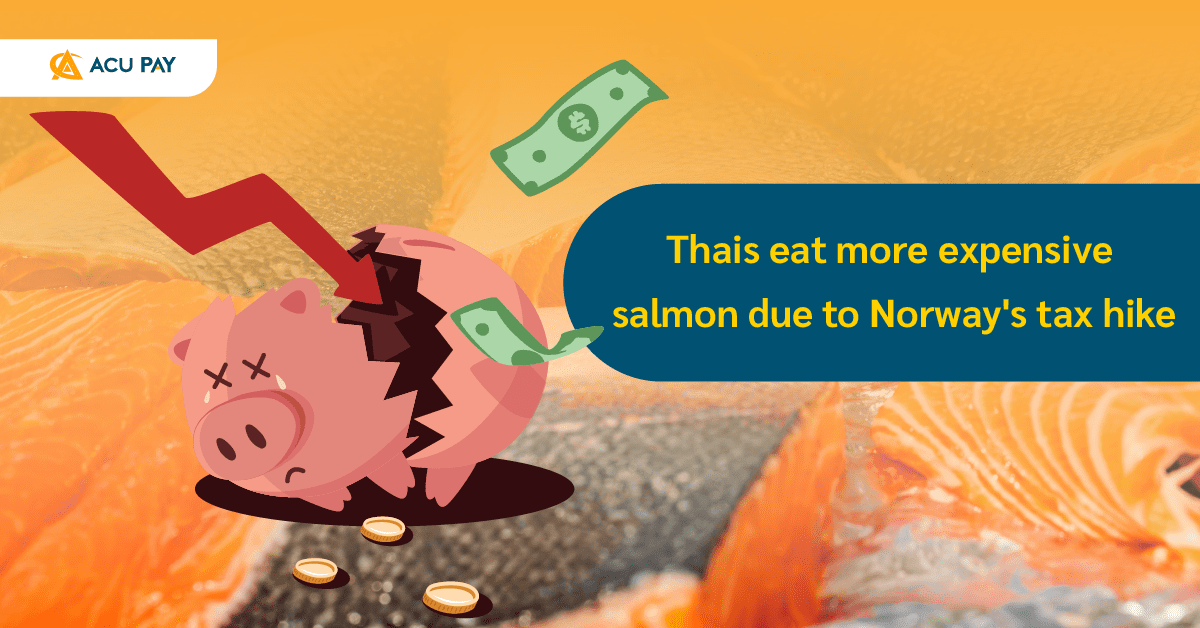

‘Norwegian salmon’ is one of the seafood ingredients that receive a lot of popularity from Thais every year, with its deliciousness and usefulness that meet health-conscious people’s needs.
However, salmon lovers need to prepare themselves because a salmon-exporting country like Norway has raised a tax on salmon farms in the country. As a result, the exportation cost may rise and make the price of salmon higher in the future.
According to Information on the development of a sustainable production and export system for seafood in Norway from the Royal Thai Embassy in Oslo, Thailand is the number one importer of Norwegian seafood in Southeast Asia and number two in Asia after China. From January to October 2022, Thailand imported 16,100 tons of salmon, 6,600 tons of trout, and 9,400 tons of Saba.
In addition, according to the Norwegian Seafood Council (NSC), Thailand imported 19,900 tons of Norwegian salmon in 2022, worth 5,800 million baht.
Norway is known to be one of the world’s most expensive taxation. In addition to the wealth tax that was imposed in early 2023 which made the country’s billionaires move out the most in history,
In the middle of last year, salmon farms, which are known as Norway’s main export products, levied a tax on salmon. It is viewed that large salmon farm owners make too much profit from natural resources. So that’s why the government has to levy taxes to develop the country, making it more equal to the general public.
Of course, this tax has a huge impact on the Norwegian salmon business which is one of the world’s largest Norwegian salmon farms, Mowi, was fully affected by Mowi’s performance after the salmon tax stated that;
The first quarter of 2023
Income 53,000 million baht
Pay tax for 3,000 million baht
The second quarter of 2023
Income 53,000 million baht
Pay tax for 12,000 million baht
It can be seen that Mowi has the same amount of income, but pays four times more taxes because the Norwegian government has asked for taxation back in the first quarter. From the original pre-tax profit, every 100 baht will be taxed at 22 baht to be taxed at 47 baht, which means that the after-tax profit goes down from 78 baht to 53 baht.
This will allow other exporting countries such as Sweden and Chile to seize market share, thus leading a host like Norway to lose its place in the salmon business.
Mowi filed a legal claim on excessive tax increases, and in the future, another easiest way to compensate for lost profits is to push the burden on consumers such as “a rise in selling prices.”
It is also expected that salmon is one of the food ingredients that may be most affected by the global warming crisis. According to the “Marine Stewardship Council” (MSC), a non-profit organization for sustainable fisheries, the ocean absorbs more than 93% of the heat stored in the Earth’s atmosphere, causing aquatic animals to be affected as well. It is likely that in tropical areas, the number of marine animals caught for consumption will decrease by 40 %.
Salmon are very sensitive to oxygen levels in the water. When the temperature rises, salmon hatches early, resulting in being eaten by large fish and a decrease in salmon breeding rate. While global salmon supplies are the same, the salmon population may be in short supply.
Due to both taxation hikes and global warming, this may result in the global salmon market, as well as Thai people who import mainly from Norway, who may be able to eat salmon at several times higher prices than before.